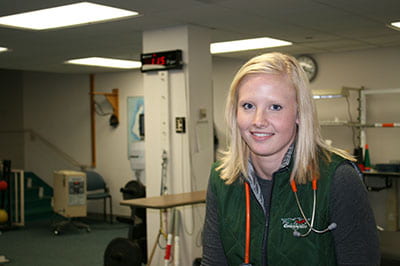 For UW-Green Bay junior Dani Thyes, the decision to take a for-credit internship wasn’t easy. But after a semester working hands-on with cardiac rehab patients at Ripon Medical Center, the Human Biology major says it’s one of the best choices she’s made.
For UW-Green Bay junior Dani Thyes, the decision to take a for-credit internship wasn’t easy. But after a semester working hands-on with cardiac rehab patients at Ripon Medical Center, the Human Biology major says it’s one of the best choices she’s made.
[youtube id= 9CjoTit-6_Y width= 400 height= 300]
“I would say that I was very skeptical about taking internships because it’s a lot of time, it’s a lot of commitment,” Thyes said. “You’re kind of scared, it’s usually out of your comfort zone. But I’m so glad that I did because I don’t know where else that I would’ve gotten the patient contact.”
Thyes got her internship through UW-Green Bay alumna Lacey Bruce, a 2006 grad who knows firsthand the importance of hands-on learning. Bruce worked through one of her former instructors, UW-Green Bay Associate Prof. James Marker, to make the connection.
“We have all our interns function as a staff member when they’re here,” said Bruce, lead of Cardiac Services at Ripon. “Obviously we’re watching over them and making sure and double-checking things — but she sees a patient when they come in and she’s responsible for their care for the day and altering their exercise as appropriate, providing their lifestyle education. It gives her the opportunity to work independently and build confidence and skills.”
Cardiac rehab staffers work closely with patients who have recently had a cardiac event or surgery, ranging in severity from having a stent placed to having a heart transplant. The rehabilitation process — and those who facilitate it — is a critical part of recovery and lifestyle change, said Marc DeGroot, a former patient of Bruce’s.
“I had a quadruple bypass about three years ago, and it was strongly recommended that I look for a program that would help me on my recovery,” DeGroot said. “And while the surgery is only part of that journey, the cardiac rehab really gets you up and moving and going and propels you forward.”
Working with patients at a critical time in their recovery is rewarding — and instructive, Thyes said.
“When you’re with a real patient who has had a heart attack or heart surgery, you really learn how to be perceptive,” she said, “and to know how to approach them the right way and what to say and what to look for.”
It also helps students learn to prepare for the unexpected, which is a critical part of the job, Bruce said.
“I think anytime you can get outside of the classroom, and just put your hands on what you’re actually learning in the classroom it’s beneficial,” she said. “Everything goes as planned when you’re in a classroom or a lab setting, but when you’re in a clinical setting you don’t know what each patient’s going to bring you each day.
“So you get that experience of always being prepared I think for what they might have happen that day.”
Bruce works with student interns from a variety of schools, and says UW-Green Bay students come in well-prepared for the rigors of a real-life clinical experience.
“Hands down, our Green Bay students have the best lab experience of any of the students we see,” she said. “The skills that they practice in lab and the stuff that they’re exposed to in lab is way above maybe what other colleges are doing.”
Thyes isn’t yet sure if she’ll pursue cardiac rehab as a career, but said the internship experience has opened her eyes to a great possibility.
“Here you really actually get to be involved with patients, so it’s a huge learning opportunity,” she said. “I just think internships are really, really important to be able to apply what you’ve learned.”

